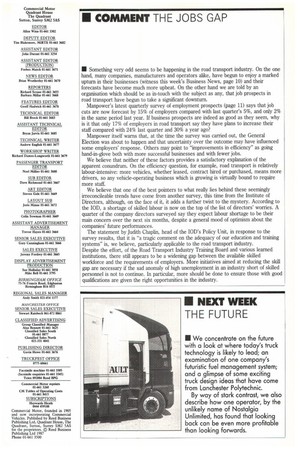• Something very odd seems to be happening in the
Page 5

If you've noticed an error in this article please click here to report it so we can fix it.
road transport industry. On the one hand, many companies, manufacturers and operators alike, have begun to enjoy a marked upturn in their businesses (witness this week's Business News, page 10) and their forecasts have become much more upbeat. On the other hand we are told by an organisation which should be as in-touch with the subject as any, that job prospects in road transport have begun to take a significant downturn.
Manpower's latest quarterly survey of employment prospects (page 11) says that job cuts are now forecast by 15% of employers compared with last quarter's 5%, and only 2% in the same period last year. If business prospects are indeed as good as they seem, why is it that only 17% of employers in road transport say they have plans to increase their staff compared with 24% last quarter and 30% a year ago?
Manpower itself warns that, at the time the survey was carried out, the General Election was about to happen and that uncertainty over the outcome may have influenced some employers' response. Others may point to "improvements in efficiency" as going hand-in-glove both with more successful businesses and with fewer jobs.
We believe that neither of these factors provides a satisfactory explanation of the apparent conundrum. On the efficiency question, for example, road transport is relatively labour-intensive: more vehicles, whether leased, contract hired or purchased, means more drivers, so any vehicle-operating business which is growing is virtually bound to require more staff.
We believe that one of the best pointers to what really lies behind these seemingly irreconcileable trends have come from another survey, this time from the Institute of Directors, although, on the face of it, it adds a further twist to the mystery. According to the IOD, a shortage of skilled labour is now on the top of the list of directors' worries. A quarter of the company directors surveyed say they expect labour shortage to be their main concern over the next six months, despite a general mood of optimism about the companies' future performances.
The statement by Judith Chaplin, head of the IOD's Policy Unit, in response to the survey results, that it is "a tragic comment on the adequacy of our education and training systems" is, we believe, particularly applicable to the road transport industry.
Despite the effort, of the Road Transport Industry Training Board and various learned institutions, there still appears to be a widening gap between the available skilled workforce and the requirements of employers. More initiatives aimed at reducing the skill gap are necessary if the sad anomaly of high unemployment in an industry short of skilled personnel is not to continue. In particular, more should be done to ensure those with good qualifications are given the right opportunities in the industry.




































































































